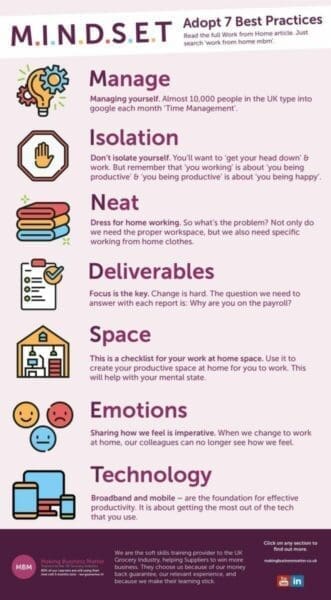The Unofficial Guide to Working from Home
Alongside an ever-changing working world, a little-known pandemic came and shook us up even more. Every aspect of our lives had to change, especially at work. Masks came in, went out and danced around until going to work was no longer an option. Cue… remote, flexible, online working! An absolute godsend to some and a complete nightmare for others.
No matter which one was you, working from home uncovered a lot of great benefits. So much so, of course, that it seems to have largely stuck for plenty of companies and jobs around the world. In fact, there is likely a sizable number of readers here who are working from home right now.
If you’re currently working from home, read on to discover tips and tricks to make your remote working experience more manageable and enjoyable. And even if you’re not currently working from home, it’s always a good idea to be prepared for the next unexpected event that may force us to work online (all fingers crossed). You might just need these tips later on so read on!
The future is always uncertain, but that’s precisely what makes it so valuable and exciting.”
– Marc Andreessen

The Optional Remote-working Scenario
As we have mostly moved out of a pandemic-ridden world, the flexibility of working from home has increased. Now, a vast number of workers have the option to go into their office or workplace or to stay and work online from home. Some choose five days a week in the office, some choose five at home, and most choose a mix of the two. The latter makes the most sense, giving yourself the best of both worlds. However, there is a bit more to consider when making this decision. Naturally, there are many questions around this topic, one being how to work from home. To help with this, here are some pros and cons of each style of work:
Going into the Office – The Pros

1. Mindset
Having a dedicated workspace does wonders for the working brain. Recently, I encountered this exact realisation. A friend of mine was trying desperately to meet her one-week deadline, pouring hours of her time into this one piece of work. She would often be stressed, unsurprisingly. The reason she was stressed, however, was not because the work was hard or because she felt she didn’t have enough time. These things are true regardless of what you are doing or where you are with it, and they were for her. However, when boxed into her little bedroom at home with pages strewn across the bed and a laptop resting on her lap, you could almost feel the stress in the air.
Thankfully, some research on how to work from home inspired her to take action. Upon moving her workspace out of her bedroom, she began to associate that space with work and, thus, worked much better there. Her bedroom was associated with doing her make-up, watching TV and going to sleep. This was simply not a workspace, it was connected to too many relaxing, stressless activities. Going into the office can help put your mind in work mode.
Click the infographic below for a larger resolution.

2. Structure
When you go in to work physically, there is likely a time you are required to be present there. There is also likely a time you are expected to leave. These two previously set timings can help massively with your work. You get, let’s say, eight hours. You do everything you can in eight hours, that’s it. Or rather, you spend the rest of your evening trying not to look at your inbox… Either way, having these structured times can help define routine and structure in your everyday life. They stop that feeling of every day merging into one and every hour becoming the next.
If you have to be at the office for time X, you have to leave your house at time Y, wake up at time Z, etc. These are the things that help build structure into your day. Structure is a hugely underrated fundamental and a key answer to how to work from home. That said, it really helps you get a grasp on your working week. Not surprisingly, it’s also something that working from home can easily negate.
3. Access
When I had the option, some time ago, of completing my assignments from home or going to college to work, I’d always opt to go into college for access. In that classroom, I was surrounded by teachers and fellow classmates that could offer advice, guidance or simply a quick chat during a break from work. At home, I would have had none of this. Simply put, I could use resources on campus that I had no access to elsewhere. It was simply a case of being in the best place for the job. It is worth considering what you sacrifice by working from home. For example, a social environment, interaction with others, advice or guidance from something other than Google. To me, this mattered hugely. It may do for you, too. With perks like these, one may not be too keen on learning about how to work online.
Going into the Office – The Cons

1. Commute
The obvious drawback of attending your workplace for work is the time and money it takes to get there. For some, avoiding a long two-hour commute into London was the first thing to celebrate once remote working came to fruition. For others, the commutes are not the slog they could be. With fuel prices being the way they are and have been, even saving two days of commuting per week means a significant financial saving by the end of the month for those that drive to work. Train ticket prices and strikes are also a huge inconvenience. So saving money and hassle here is a great benefit of staying at home. It is definitely worth considering the time, money and hassle of commuting to work every single day when you have the option not to.
2. Lack of Freedom
The workplace, whilst good for your working mindset, can also be quite restrictive. Pot Noodles or shop-bought sandwiches for lunch only bring a slight convenience over preparing lunch for yourself the night before. Either way, you are either out of pocket for your working meals or spending time in preparation every evening. It’s not just food, either. Taking a few minutes for a personal call, a chat with a family member or a quick snack is not nearly as easy in an office setting. The office also allows you less freedom to capitalise on your working style. Taking a quick break from work to get some fresh air or watch some TV is pretty much not an option in the office. There’s a lot to be said about using your own bathroom, too.
Choosing to Work from Home – The Pros
How to work online is a buzzing question due to the benefits that come along with it. Below are just a few of these driving factors.

1. Convenience
The extra convenience afforded to you by working at home is hard to beat. This goes hand in hand with the lack of freedom provided by the office setting. Being able to eat whatever you’d like, logging in and out at times better suited to you, and staying within the comfort of your own home are all extra conveniences that remote working brings. The difference here can be night and day for people who really benefit from the extra convenience.
2. Mindset
In the same vein as the pro of working in the office, there is a certain opportunity to work with a better mindset when staying at home. We tend to enjoy the comfort of our own familiar space. People that suffer from mental health issues, particularly socially, get a much better chance at working with a good mindset when working from home. The extra time gained by a lack of commute can also give you time for things like exercise and outside air that can really help get you in that working mindset.
Furthermore, the peace and quiet of a home-alone situation can also boost productivity. Note that a lack of distraction is also felt by some that choose to work online. For me, the distractions skyrocket when I am alone. My phone, the kettle, and the fridge… All things that I am not judged for using as procrastination tools when there is no one around. However, this can be completely the opposite for many people. No people, no noise, no hallway chats – the definition of distraction-free for a lot of workers. Think about whether your mindset would benefit by choosing to stay at home.
3. The Lack of Commute
Of course, the cons of one become the pros of the other. Money and hassle do play a part here but it is the time gained that I feel is the biggest pro of remote working. Ask yourself this: if you didn’t have to travel, say, thirty minutes to work but still woke up at the same time you would if you did, what would you do with that time? Me, I’d use it to get outside. Being outside is among the very few things that actually help me feel awake and ready for the day, besides an absurd amount of coffee, of course. This extra half an hour would really benefit me in this sense. How could that time benefit your day?
Choosing to Work from Home – The Cons

1. Lack of Routine
When choosing to stay at home for work, it is easy to fall into a less structured working day. Having no commute means you can roll out of bed into work in minutes if you’d like. Since there’s no pressure to look a certain way, messy hair and tracksuit bottoms are perfectly acceptable when no one at work can see them. Whilst this may sound like a great pro of remote working, it actually makes it really difficult to go about your working day with good mental preparation and mindset.
2. Separation Difficulties
We all know about the importance of being present. When at work, your mind should be 100% at work. The same goes for family time, social gatherings etc. When you merge the settings of work and play, you often end up merging the scenarios themselves. Choosing to go into the office affords you the ability to, at least, try and switch off after the working day is done. It is significantly harder to switch off from work when work is at your kitchen table. Consider how much this may hinder both your working and social life.
So, overall there are plenty of reasons to choose either working from home or in your working environment. Hopefully, those pros and cons helped you understand how best to structure your office/home working week. I shall finish off with some quick tips for those who have chosen to stay at home for work:
7 Tips for How to Work Online:

1. Find Your Routine
As aforementioned, it’s tough to structure your day independently of the structure provided by working in the office. Consider how you’d spend the extra time and if it can benefit you. This is one answer to how to work online.
2. Establish Boundaries
Working from home, for most people, does not mean working alone. Kids, husbands, wives and relatives can all be a big inconvenience at work. Try to establish boundaries with whoever is around during your remote working day to avoid trying to hear conference calls over screaming kids.
3. Define Your Workspace
If you’ve got a space for a home office – fantastic! Use it. Use it only for work. But if not, like most of us, try to cordon off an ‘office’ within your home. The difference in mindset when you have a dedicated working space is massively beneficial.
4. Consider Uniform
Different companies and job roles have different regulations regarding dress for work. Whilst this won’t affect your remote working, Zoom calls in your pj’s may not be the best thing for your working mind. This tip is one of the unpopular answers for how to work online, but it works!
5. Find Some Interaction
The social interaction of an office, whilst small, does have an impact on your working day. Try to find some of this at home. Even if it means grabbing some coffee from a local coffee shop, being around people will always benefit your day.
6. Get Outside!
This may sound contradictory to someone interested in learning how to work from home. As I said, getting outside makes a big difference to how I feel going into the day. Now, it doesn’t have to be in the morning but some fresh air at some point in your day is an absolute must. You may be fine without it for a few days, even weeks but eventually, cabin fever will catch up with you and make you feel like you’re going mad!
7. Communication is Key When We Consider How to Work Online
Learning how to properly communicate is paramount to remote working. We all have a certain level of in-person communication skills purely from being a person ourselves. As humans, however, we have very little experience communicating solely through technology. A good idea would be to research some tips on how to communicate better online. In fact, there’s an MBM article for that to help you. Those tips will definitely help you communicate better through tech.
That’s it! Hopefully, these tips showed you how to work online for maximising productivity and improving your health. Make sure to follow our page on Facebook and Linkedin for more content.





